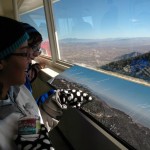Several years ago, I had the fortune of traveling to Florence, Italy, where Michelangelo's "David" lives. It was an early summer morning, smack in the middle of high tourist season, and I was, unbelievably, the only visitor in the Accademia Gallery. Except for the guard, I had the statue all to myself (for about three minutes).
The guard, in his best English, told me that Michelangelo "didn't make David". I thought he was trying to dispel some myth, like the one about Shakespeare not really writing all those plays, or even being one single person. I looked at him blankly.
According to the museum guard, Michelangelo believed that "Every stone already has the statue inside it. The artist only sets it free." I've thought about that morning and what the guard said many times over the course of my past 20 years as an educator.
And I thought about it again the other day when I bumped into Liza, a former student of mine who is in her second semester at the University of Arizona. Liza was my advisee for four years. I spent a lot of time with her because of that, but she was so quiet that I never felt I actually knew her. My assumption about Liza was that she was not interested in anything. I wasn't deeply worried about her because she kept her grades up, but I was concerned that she didn't seem to be heading in any one particular direction.
Nevertheless, I didn't push the issue. I spent four years listening to Liza unexcitedly discuss her learning at her annual Roundtable Conferences. Her end-of-year Gateway Presentations were solid and direct, but not as enthusiastic as those of her peers. My regular discussions with her about her future were always met with a matter-of-fact "I'm not sure". Her parents were slightly worried, but I kept telling them that one day Liza would wake up and get excited about something, even though I had trouble imagining an excited Liza.
When I bumped into her the other day, I enthusiastically said "So! How's college?" Of course I expected her to coolly say "fine" or "ok". But she didn't say either of those things. She was cool alright, but what she said was "I've just declared my major. Pre-med. I want to deliver babies." Just like that. As if she were telling me what she had just had for lunch.
And in that moment I thought "Of course. Of COURSE Liza is going to deliver babies!" Suddenly the indifferent and dispassionate Liza I remembered was stable and reliable. And who else would a stressed-out woman in labor want by her side but a cool, centered, steady, clear-thinking doctor like the one that Liza is going to be someday?"
I'm beginning to think that our true job as educators is to believe what Michelangelo did–that we do not shape, make, or form our students into future adults. Our job is to listen, pay attention, create safe spaces, remove obstacle, and celebrate when our students are being their best selves. The people our students are going to be some day are already deep inside of them. Our job is to help set those people free.








